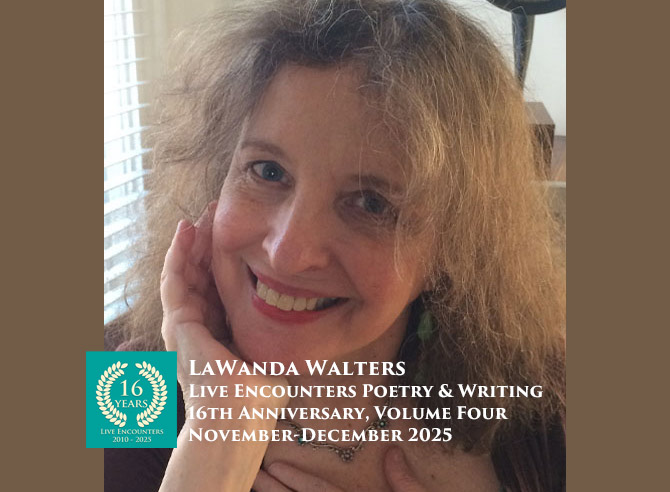
Live Encounters Poetry & Writing 16th Anniversary Volume Four
November- December 2025
Mermaid Sirens Calling Boats at Sea, poems by LaWanda Walters.
Splendor in the Grass
The crickets sound so optimistic.
They still tune their instruments
at twilight, evensong. They fill my ears
with their chorus of yeses, sighs, maracas.
The crescendo and then, en masse,
diminuendo. Virtuoso phrasing,
offbeat percussion in the grass.
Crickets stand in for a nightingale,
and the sun goes down on the earth.
Mermaid Sirens Calling Boats at Sea
A Provincial Tale
Call me Madame Bovary.
I’d married a man
who never got jealous, thinking
it was wild, passionate love that caused
my first husband to beat me up.
Back then I was “Maggie, Girl of the Streets.”
But I moved in with my mother in Atlanta, found
a job at the Circulation Desk at Emory.
David was handsome enough, and at first
I thought, since he was checking out Artforum
with his faculty card, that he was an artist.
“So you teach Art?” I asked on our first date.
“Economics,” he said, and I hardly knew what that meant.
But I liked the idea that he was a professor,
that for once I was making a good decision.
He actually said, “I might not look like much
but I have great genes.” Just what I was shopping for,
and so I said yes. Sex felt good enough
but was so perfunctory. I missed the passion,
but we’d bought an old house that reminded me
of books I loved set in England. The basement had
a genuine bar, from the days of prohibition, a bathroom
with an opaque window in the door that said “W.C.”
I’d be upstairs looking at catalogues and ordering
a fountain with a lion’s face, cute outfits for going out.
He’d be in the basement bar, where he kept Penthouse
magazines. We’d had our children, though, and I was happy.
It was our kids, playing around the bar, who discovered
the magazines. For once he was the bad one.
I’d discovered I was pretty. My curly hair
was in style finally—you’d call it “big hair” now.
His brother said I was vain when I used the rear-view
mirror to put my make-up on. Yes, I liked to shop
and know I seemed superficial. When I look at old pictures
of myself I wish I looked like that, except you can see
I was too aware of my looks. I’d like to warn that young woman,
Madame Bovary in Cincinnati, maxing out credit cards
and flirting with everyone. Then David got diagnosed with
a “cranial pharyngioma.” Benign, but there’s not much room
in the brain. He was brave about the surgery, but of course
the tumor grew back. “I don’t want them to cut into my skull again,”
he said in the Kroger parking lot. Like a pressed flower,
those words preserve his pure and sane worry, as if
he knew what would happen. And the doctors did
“nick” something. Blood in the brain burns like acid.
I didn’t handle it well. The psychologist at the hospital
had a framed picture of his perfect family on his desk, facing out.
I broke down when he said, “I’m sure you and your husband
had made lots of plans.” They didn’t approve of my crying—
“Do your children know you’re so depressed?” It turned out
my brother-in-law was talking to the staff about taking away
my custody. He’d told David (and David told me, with all
his impairment), “You have two problems. You have this wife,
and you also have a brain tumor.” So I was worse
than the tumor. My children and I got through it.
Our genes, together, had made lovely children, so David
had been right about that. My kids say I’m a good mother
but I know they are better human beings—
fiscally responsible, having been there when I ordered
all those flamingo shakers and tablecloths on eBay.
© LaWanda Walters
LaWanda Walters earned her M.F.A. from Indiana University, where she won the Academy of American Poets Prize. Her first book of poems, Light Is the Odalisque, was published in 2016 by Press 53 in its Silver Concho Poetry Series. Her poems have appeared in Poetry, Georgia Review, Southern Review, Nine Mile, Antioch Review, Cincinnati Review, Ploughshares, Shenandoah, and several anthologies, including Best American Poetry 2015, Obsession: Sestinas in the Twenty-First Century, and I Wanna Be Loved by You: Poems on Marilyn Monroe. She received Ohio Arts Council Individual Excellence Awards in 2020 and 2024. She lives in Cincinnati with her husband, poet John Philip Drury.

